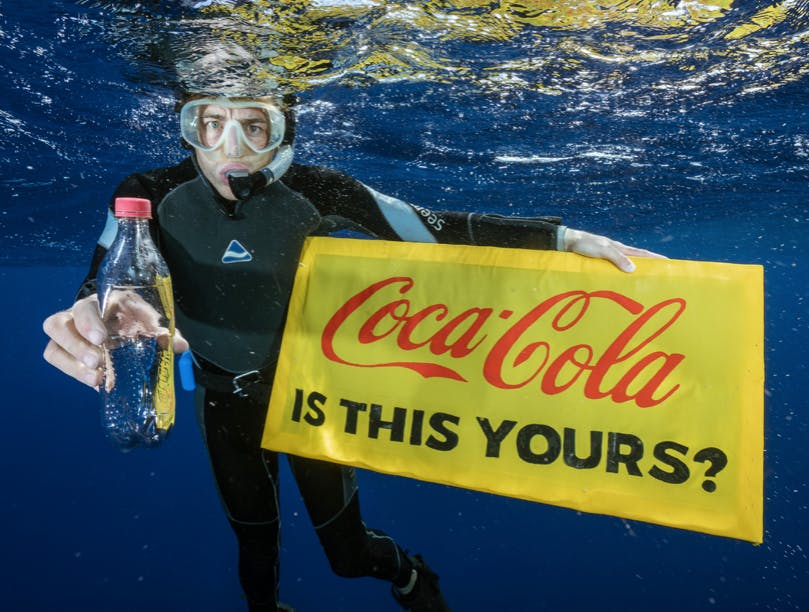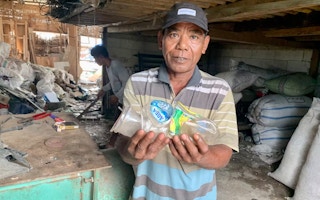Sustainability target deadlines for big consumer brands to use more recycled plastic in their products and packaging are looming, but high volatility in prices and stock of the material is turning them off recycled content, casting a cloud over the already-spluttering circular economy.
Asian recyclers that Eco-Business spoke to say that they are struggling to deliver recycled polymers at the volume, quality and prices that their customers – mainly multinational consumer goods brands – are demanding.
The market for recycled polymers has yo-yoed in the years since the Covid-19 pandemic, but this year, recyclers are reporting that low oil prices fuelled by the Ukraine-Russia conflict, exorbitant shipping costs resulting from disruption in the Red Sea and ongoing economic uncertainty is squeezing them further.
The market for recycled Polyethylene terephthalate (R-PET) – the most commonly used plastic by consumer brands and most reliable market indicator – has “lacked consistency” since 2020, with disruptions causing forecasts to be “tossed out the window,” said Alvaro Aguilar, head of logistics at Prevented Ocean Plastic, a Bali-based recycler.
The European Union’s Single Use Plastic Directive, which mandates all PET beverage bottles sold in the EU to contain 25 per cent recycled content by 2025, promised to drive global demand for recycled content, but a lack of regulatory clarity and weak purchasing from brands has clouded the outlook, Aguilar said.
“With little clarity, it’s hard to plan stock [of recycled plastic]. No one wants to take the risk,” he said.
“
Brands are asking for recycled plastic at virgin prices, which is not feasible.
Tom Jackson, co-founder, Honest Ocean
Meanwhile, R-PET supply has been squeezed due to demand from competing industries, with fashion, automotive, electronics and toy companies jostling with consumer goods firms for recycled resin.
Doug Woodring, managing director of Ocean Recovery Alliance, a Hong Kong-based waste non-profit, estimates that there is a 6 million-tonne shortfall in recycled plastic. “Brands want it, but they can’t get their hands on it,” he said.
Rob Kaplan, chief executive of Circulate Capital, a circular economy investment firm that operates in South and Southeast Asia, said he expects the market to recover by the second quarter of this year, as more brands place orders for recycled plastic.
Brands balk at prices
In the years since the Covid-19 pandemic, the low price of oil has subdued the price of oil-derived virgin plastic, and recycled plastic is now significantly pricier than virgin, slowing the circular economy for plastics.
Prices of virgin HDPE and LDPE, plastics used to make bottles and other containers, have fallen by 10 per cent and 14 per cent, respectively, from the second to third quarter of – and have plummeted by 125 per cent and 131 per cent, respectively, compared to Q4 2020.
R-PET currently costs around US$1000 per tonne, while virgin plastic is around US$800-US$900 per tonne.
Consumer brands have slowed their spending on recycled plastic as a result, despite high-profile sustainability commitments to use more recycled content in their products and packaging.
Major consumer goods companies and retailers signed a pledge in 2018 to increase the proportion of recycled plastic they use to 26 per cent, and cut the amount of virgin plastic they use by 18 per cent by 2025.

Coca-Cola has come under increasing pressure to reduce its plastic footprint from environmental pressure groups. Image: Justin Hofman / Greenpeace
Targets vary by company, but few look likely to meet any of their commitments, despite pressure from environmental groups and consumers for bolder action to tackle plastic pollution.
Coca-Cola, which produces 200,000 plastic bottles every minute and ranks as the world’s biggest plastic polluter in waste audits, has pledged to use 50 per cent recycled content in its bottles by 2030. The company has griped about high recycled plastic prices and poor systems for collecting recyclables in Asia that make meeting targets difficult.
PepsiCo has committed to boost its recycled plastic content ratio to 25 per cent by 2025 and reduce virgin resin use by 20 per cent by 2030. But while the company has marginally increased its recycled content ratio, its use of virgin has increased by more. PepsiCo’s CEO blamed this on the “limited availability and high cost of recycled content”.
“Brands are asking for recycled plastic at virgin prices, which is just not feasible,” said Tom Jackson, co-founder of Honest Ocean, a company that recycles plastic trash recovered from Indonesia’s coastline.
Recycling plastic involves various stages of production – from collection and sorting to melting and moulding – and each player in the value chain “must make money,” Jackson said.
But buyers object to paying more for recycled plastic, which is usually dirty and smelly when collected, and hard to process at the right quality. Shipments of recycled plastic have been rejected over quality concerns, sources familiar with the market say.
Eco-Business has approached PepsiCo and Coca-Cola for comment.
Aguilar argues that quality is not the issue, and brands have prioritised cost over value. Smaller buyers, such as British cosmetics firm LUSH and German supermarket chain Aldi, have shown more willingness to fulfill their sustainability goals, he said.
If big brands are serious about hitting their 2025 targets, they will need to place substantial orders of recycled plastic by the second quarter this year, so that their products are on shelves in time, Aguilar noted.
Some brands have started to experiment with long-term contracts with recyclers to get around the price volatility problem, Kaplan observed. “Long-term, floating prices with floors and ceilings ensure that no one gets left out in the cold,” he said.
Currently, the relationship between brands and recyclers is “not about risk sharing but risk transfer,” he noted.
“
The industry is focused on cost not on value. Sustainability has been deprioritised.
Alvaro Aguilar, head of business development and logistics, Prevented Ocean Plastic
Controversy may also have turned brands off recycled plastic. A legal battle between Ocean Integrity and ReSea over waste that was allegedly dumped instead of recycled in Indonesia highlighted what market observers have dubbed the “wild west” of waste management.
Who’s paying the price of a volatile recycling market?
Recycling firms in Asia have been struggling to stay afloat amid uncertain market conditions and soaring shipping costs.
“Some of our competitors have gone under, or are close to going under,” said Jackson of Honest Ocean, whose business has pivoted to chemical recycling where he believes there is more growth potential.
Smaller recyclers have found the market conditions tough as cash flow has dried up, noted Dian Kurniawati, founder and director of Tridi Oasis, a R-PET bottles manufacturer in Indonesia.
The most vulnerable, however, are on the front line of the plastic crisis – the waste collectors who process up to 90 per cent of Southeast Asia’s plastic waste, said Aguilar.
Factories in Indonesia have been unable to shift stock of recycled plastic, so have stopped buying material from collectors.
“When the market is good, collectors don’t benefit much though they have enough to buy food. When the market is bad, they suffer more than anyone,” he said.
Some recyclers have relied on philanthropic funding to keep going, although plastic recycling has not been attracting much support from donors, Woodring noted.
“There’s a giant funding gap. But donors won’t give money [to tackle plastic pollution] and banks won’t fund it as it’s too small an investment,” he said.
Regulation gaps
Polluter pays laws, such as the EU’s Single Use Plastic Directive, are needed to push companies to use more recycled plastic or try less environmentally damaging plastic alternatives, say industry observers.
Even Coca-Cola and Unilever, two of the world’s largest users of plastic packaging, have publicly backed Extended Producer Responsibility (EPR) laws, although Coke has also lobbied against recycling schemes in the past.
In Southeast Asia, a global hotspot for marine litter, only the Philippines and Vietnam have enacted EPR regulations, although questions have been raised over compliance and implementation.
Singapore is expected to roll out an EPR scheme next year, two decades after a such a scheme was proposed, and Indonesia has a voluntary EPR scheme in place.
“There have been many discussions about how to implement EPR [in Indonesia]. However, real regulations and enforcement are not there yet,” said Kurniawati.
Woodring said that governments will have to enact laws like the EU’s, which mandates recycled plastic use, eventually, to respond to growing pressure to act on plastic pollution. The coming United Nations treaty on plastic pollution – the fourth round of negotiations are slated for April – is expected to nudge policymakers into action.
In the meantime, the market needs “leaders” to take the hit and pay a premium for recycled plastic, he said.
“Companies need to do voluntary EPR, until it is not voluntary. The money will feed into supply chains to achieve economies of scale, then prices will come down.”
“At the moment, it’s a chicken and egg situation,” he said.
False solution?
Meanwhile, green groups have been calling out recycling as a false remedy, as only 9 per cent of plastic is recycled and 14 million tonnes of the material continues to enter the ocean annually.
Greenpeace is calling on governments to reduce plastic production by 75 per cent by 2040. Plastic production is projected to triple by 2050 and consume 13 per cent of the world’s carbon budget for keeping planetary heating below 1.5°C.
A report by Oceana has projected that even if PepsiCo and Coca-Cola met their recycled content targets, aquatic pollution from single-use bottles would fall by only 7 per cent.
The non-profit said the R-PET market is not reducing marine pollution and has called for an industry-wide pivot to refill solutions to wean companies off plastic packaging.

















